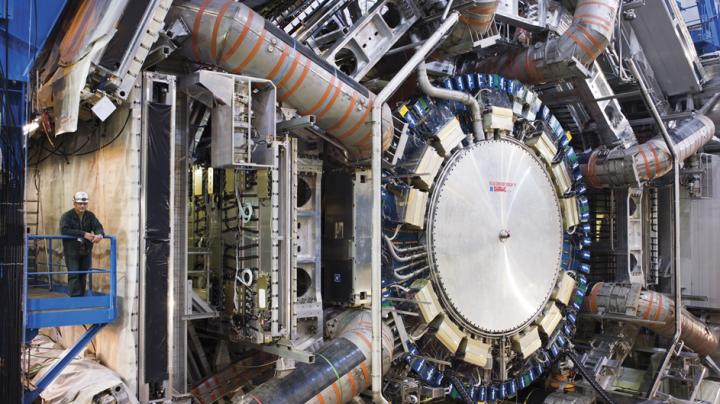The National Science Foundation awards $75 million to a Columbia-led team to support major improvements necessary to advance high-energy physics.

Credit: Photo: Courtesy of CERN
Columbia University will lead a team of scientists in an effort to enhance the capabilities of the ATLAS detector at the Large Hadron Collider (LHC), the world’s highest-energy particle accelerator designed to produce some of nature’s tiniest and most exotic subatomic particles by smashing protons together.
The multi-year, $75 million project, funded by the National Science Foundation (NSF), will allow the ATLAS detector to take full advantage of the increase in luminosity, or rate of collisions, planned for an upgrade of the LHC accelerator, operated by the European Organization for Nuclear Research, known as CERN.
The LHC–which is housed underground, deep beneath the international border separating France from Switzerland–accelerates protons in a ring of superconducting magnets almost to the speed of light before they collide and explode, giving rise to particles possibly never seen before.
“These improvements will enable scientists to push the boundaries of discovery, increasing the likelihood of revealing entirely new phenomena–from extra dimensions of space to the building blocks of dark matter,” said Michael Tuts, professor of physics at Columbia University and principal investigator on the project. “They will open up a new window on particle physics, bringing us closer to decoding how the universe truly works.”
Columbia’s work on the ATLAS upgrade is expected to begin this month and continue over five years. Tuts and his team will design, build and test key electronic components for the ATLAS system at Nevis Laboratories in Irvington, New York, the University’s primary center for the study of high-energy experimental particle and nuclear physics, and then ship them overseas for installation in ATLAS.
John Parsons and Gustaaf Brooijmans of Columbia’s physics department will direct the Columbia technical aspects of the project, which will provide training opportunities for postdocs and graduate students.
The 7,000-ton ATLAS, the largest detector ever constructed for a particle collider, acts as a giant “digital camera” that captures the particle debris produced in collisions for further analysis. It was built between 1998 and 2008 by an international collaboration of more than 3,000 scientists and engineers and nearly 200 universities and laboratories from 38 countries. This NSF award for the high luminosity upgrade of the ATLAS detector continues the international collaboration.
In 2012, researchers at ATLAS and the Compact Muon Solenoid (another detector at CERN) jointly discovered a long-theorized particle known as the Higgs boson, the missing piece of physics’ so-called “standard model,” which describes elementary particles and how they interact. The Higgs particle, which led to the award of the Nobel Prize in Physics in 2013, signals the existence of an invisible energy field throughout the universe that imbues other particles with mass.
The high-luminosity LHC upgrade, estimated for completion in 2025, will increase the total number of collisions in the ATLAS detector by a factor of 10, according to CERN, enabling scientists to collect data more efficiently and at higher rates.
Scientists hope higher luminosity will allow them to continue the hunt for dark matter, which comprises 25 percent of our universe; capture and analyze new particles, interactions and physical properties; and increase the computing capacity to share that data with scientists around the world.
The Columbia-managed NSF ATLAS upgrade project supported by this award includes the following institutions: University of Arizona, Boston University, University of Chicago, University of Illinois at Urbana-Champaign, Indiana University, University of Michigan, Michigan State University, New York University, Northern Illinois University, University of Oregon, University of Pennsylvania, University of Pittsburgh, Southern Methodist University, Stony Brook University, University of California-Irvine, University of Massachusetts-Amherst, University of Texas- Arlington, and University of Texas-Austin.
###
Media Contact
Carla Cantor
[email protected]




